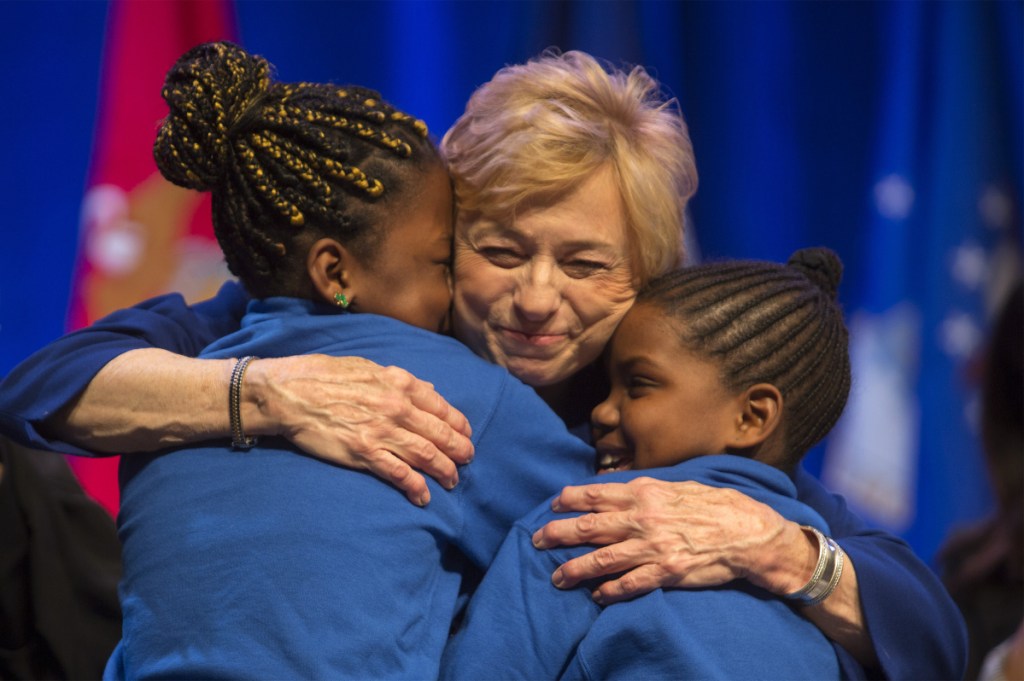“Struggles that affect all Maine people are disproportionately felt by Maine women, and even more so by Maine women of color. Women face greater poverty and high levels of violence. The lack of essentials such as reproductive rights; high-quality, affordable child care; flextime; and training for higher-paying jobs combine to make their lives even more difficult. If we are to succeed at economic development, we must recognize that these issues are not ‘women’s issues’ but issues that affect us all.”
I’m not sure exactly when I wrote that for a speech I was giving, but I do know it pretty much sums up what I’ve been working for these last 35 years. So it was fitting that at the beginning of a new year I participated in events that marked celebratory milestones in Maine and in my life.
The first was the celebration of the election of Gov. Janet Mills. Finally, after female presidents of the Senate and speakers of the House put the cracks in the ceiling, the people of Maine put their faith in a female executive to lead us.
Here was a woman who knew the struggles women face. She was a founding member of the Maine Women’s Lobby, which for the past 40 years has brought the voices of women and girls to the ears of the Legislature and the administration. When the Appropriations Committee, in the dead of night in 1978, failed to fund a bipartisan agreement to fund domestic violence shelters, Janet Mills was one of three women who collected as little as $2 from other women to make sure a lobbyist was there the next year when the behind-the-scenes horse-trading was going on.
Later, as a working mother in the Legislature and as attorney general, she lived through the struggles women experience daily. As governor she will be articulating those struggles and implementing fixes, as she just did with the Medicaid expansion effort supported by nearly 60 percent of us at the polls in 2017. That alone is a reason to celebrate.
The second celebratory event was my retirement from the Bingham Program, where for the past 14 years I’ve had a dream job. It’s the kind of job just about everyone I’ve worked with in the nonprofit sector dreams about. No more trying to make ends meet with too little money for too much need. No more needing to fill out reports that take you away from the work you love to make sure your funders can justify their grant to your organization. No more constant fundraising to prove your work is worthy. I landed a position in philanthropy.
The thing about this philanthropy that made it my dream job is its mission of “investing in the health of Maine people.” Shortly after joining Bingham, we began an initiative to try to change the cultural acceptance of violence against women and children by engaging the voices of business and men. We realized without those voices at the table, there could be no cultural shift. The attorney general at the time — Steve Rowe — and the Maine Development Foundation, led by Laurie Lachance, became our strongest allies, and we joined forces to raise awareness of the critical importance of healthy brain development before the age of 5.
It may seem to be a weird stretch from preventing violence against women to supporting high-quality early education and care from birth to kindergarten. However, findings of such diverse researchers as Rob Grunewald at the Minnesota Federal Reserve, conservative University of Chicago economist James Heckman, and physicians Rob Anda at the Centers for Disease Control and Prevention and Vincent Felitti at Kaiser Permanente, revealed that children who in their early development have adults who love and support them are more likely to arrive at kindergarten ready to succeed, and eventually graduate from high school, earn more money, and lead healthier lives.
For the past 12 years, the Bingham Program has spent $2 million, leveraged millions more, engaged multiple sectors of the economy including businesses, and pledged to continue this particular initiative for at least another eight years.
In addition to its work to prevent domestic violence, adverse childhood experiences, and support efforts to strengthen early childhood education and care, the primary work of the Bingham Program has always been to strengthen public health efforts, mostly at the community level. After the 2010 election, however, when it became clear that all the hard work of developing a strong public system was being dismantled and everything we had been working for was under attack, the Bingham advisers decided it was time to invest more money and staff in advocacy efforts to defend our system. That’s what we’ve been doing for the past eight years.
With the election of Janet Mills, it feels right for me to leave the work of defending and move over to let the younger generation take the lead in the work of creating their future. I’ve been blessed with multiple opportunities to make a difference in areas I feel strongly about and I couldn’t feel more hopeful that as Maine goes, so goes the nation in 2020.
This is my last column for the newspaper. I am deeply appreciative for the invitation to write them. It’s given me a way to clarify what’s important to me and why it should be important to others.
Looking back it appears that much of what I wrote concerns how we take care of Maine’s most valuable resource — our kids. I couldn’t more grateful to see that concern now being echoed by businesses and men — and by a governor who understands that Maine’s future economic prosperity begins in early childhood.
Karen Heck is a resident and former mayor of Waterville.
Send questions/comments to the editors.



Comments are no longer available on this story